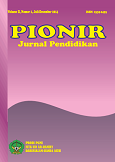THE ABILITY OF ISLAMIC RELIGIOUS EDUCATION TEACHERS AT JUNIOR HIGHT SCHOOL TAPAKTUAN IN USING THE MERDEKA MENGAJAR PLATFORM
DOI:
https://doi.org/10.22373/pjp.v14i1.26307Keywords:
Merdeka Mengajar Platform, Indepedent CurriculumAbstract
The purpose of this study was to see the ability of Islamic Religious Education teachers at Tapaktuan Junior High School in using the Merdeka Mengajar Platform. This study uses a quantitative method. This study was located at Tapaktuan Junior High School. The sample in this study were Islamic Religious Education teachers who had a Merdeka Mengajar Platform account. There were 5 Islamic Religious Education teachers who had a Merdeka Mengajar Platform account. The data collection techniques used in this study were questionnaires and observations. The data analysis technique used a percentage formula, then analyzed using descriptive statistics. The results of this study are that most Islamic Religious Education teachers in Tapaktuan are not yet fully able to use the Merdeka Mengajar Platform. These teachers still need to improve their abilities in all the features available on the Merdeka Mengajar Platform. While a small number of Islamic Religious Education teachers are already able to use the Merdeka Mengajar Platform, they still need to improve their abilities in the Student Assessment and Work Results features. Keywords: Merdeka Mengajar Platform, Independent CurriculumReferences
Alimuddin, J. (2023). Implementation of the independent curriculum in elementary schools. Kontekstual Scientific Journal, 4(02), 67-75., https://doi.org/10.46772/kontekstual.v4i02.995
Aprianti, A., & Maulia, ST (2023). Education Policy: The Impact of Curriculum Change Policy on Teachers and Students. Journal of Education and English Literature, 3(1), 181-190.,https://doi.org/10.55606/jupensi.v3i1.1507
Aprillia, E., Nurhayati, C., & Pandiangan, APB (2023). Curriculum changes in the learning process. Journal of Educational and Social Sciences, 1(4),402-407.,https://doi.org/10.58540/jipsi.v1i4.78
Faisal, F., Ali, H., & Rosadi, KI (2021). Simdik-Based Educator and Education Personnel Management System in Islamic Education Management. Journal of Applied Management Science, 3(1), 77-85.
Fitriyana, H., Setyosari, P., & Ulfa, S. (2021). Analysis of Technological Knowledge Ability of Prospective Elementary School Teachers. Journal of Educational Technology Studies, 4(4), 348-357., http://dx.doi.org/10.17977/um038v4i42021p348
Hakim, A. N., & Yulia, L. (2024). Dampak teknologi digital terhadap pendidikan saat ini. Jurnal Pendidikan Sosial Dan Humaniora, 3(1), 145-163.
Khotibul Umam. 2013. New Paradigm of Islamic Education Management; An Alternative in Managing Islamic Education for Further Advancement. (Jember: IAIN Jember Press.
Mawati, AT, Hanafiah, H., & Arifudin, O. (2023). The impact of changing the education curriculum on elementary school students. Primary Edu Journal, 1(1), 69-82.
Meuthia, R. (2023, August). Community Learning Assistance Strategy in Utilizing the Merdeka Mengajar Platform for the Implementation of the Merdeka Curriculum. In Proceedings of the National Seminar on Elementary Education (Vol. 1, No. 1, pp. 614-639).
Purani, NKC, & Putra, IKDAS (2022). Analysis of teacher readiness in implementing the independent learning curriculum at SDN 2 Cempaga. Rare Pustaka Elementary Education Journal, 4(2), 8-12., https://doi.org/10.59789/rarepustaka.v4i2.125
Rahayu, R., Rosita, R., Rahayuningsih, YS, Hernawan, AH, & Prihantini, P. (2022). Implementation of the independent learning curriculum in driving schools. Basicedu Journal, 6(4), 6313-6319., https://doi.org/10.31004/basicedu.v6i4.3237
Sadriani, A., Ahmad, MRS, & Arifin, I. (2023, July). The role of teachers in the development of educational technology in the digital era. In National Seminar Dies Natalis 62 (Vol. 1, pp. 32-37).
Sudijono. Anas. (2004). Introduction to Educational Statistics. Jakarta: Raja Grafindo Persada.
Sugiyono. (2012). Mixed Methods Research Methods. Bandung: Alfabeta.
Sugiyono. (2017). Educational Research Methodology. (Quantitative Education. Qualitative. And R&D). Bandung: Alfabeta.
Sumual, H., Pontoh, S., Kaparang, MW, Kumajas, VN, Wongkar, MM, & Mosey, SH (2024). The Role Of Creative And Innovative Education Management In Improving Human Resources. Journal of Education and Teaching Review (JRPP), 7(2), 5122-5129.
Syafitri, Y. (2023). The Impact of Technological Developments in Education During the Pandemic for Millennials. Journal of Pedagogy and Online Learning, 2(1), 21-27.
Wulandari, R. (2023). Dampak perkembangan teknologi dalam pendidikan. Jurnal PGSD Indonesia, 9(2), 66-76.
Downloads
Published
Issue
Section
License
- Authors retain copyright and grant the journal right of first publication with the work simultaneously licensed under a Creative Commons Attribution License that allows others to share the work with an acknowledgment of the work's authorship and initial publication in this journal.
- Authors are able to enter into separate, additional contractual arrangements for the non-exclusive distribution of the journal's published version of the work (e.g., post it to an institutional repository or publish it in a book), with an acknowledgment of its initial publication in this journal.
- Authors are permitted and encouraged to post their work online (e.g., in institutional repositories or on their website) prior to and during the submission process, as it can lead to productive exchanges, as well as earlier and greater citation of published work (See The Effect of Open Access).

